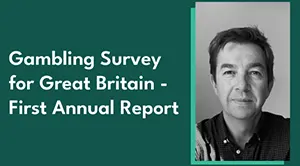 July 25th saw the publication of the Gambling Commission’s first annual report of the Gambling Survey for Great Britain (GSGB), providing new insight into the gambling behaviour of UK residents.
July 25th saw the publication of the Gambling Commission’s first annual report of the Gambling Survey for Great Britain (GSGB), providing new insight into the gambling behaviour of UK residents.
The National Centre for Social Research and the University of Glasgow helmed the survey, and 9,804 participants took part. In addition, the survey was carried out through what Professor Patrick Sturgis, Professor of Quantitative Social Science at the London School of Economics, referred to as “push-to-web mixed mode design,” as well as “random probability sampling from the Postcode Address File.”
By the time the next survey results are due to be analysed, the UKGC believes the sample size will increase to roughly 20,000, and future data will be comparable with the information included in the first report. However, as the methodology used in the first GSGB report differs greatly from that of past surveys, Professor Sturgis advised caution when interpreting the results and urged that direct comparison to previous survey data be avoided.
A spokesperson for the Betting and Gaming Council, as well as John Bollom, National President of Bacta, issued similar warnings, with the former noting there are concerns among member operators about the data being potentially unreliable and presenting problem gambling to be more widespread than it is in reality.
Key Results Regarding Participation and How Gambling Was Viewed by Respondents
 According to the GSGB, adult participation in gambling stood at 48% in the past four weeks based on the survey data, with this estimation dropping to 27% when only those who did not participate in the lottery were included in the results.
According to the GSGB, adult participation in gambling stood at 48% in the past four weeks based on the survey data, with this estimation dropping to 27% when only those who did not participate in the lottery were included in the results.
Online gambling was more popular among those who took part in the survey, with 37% telling researchers they had gambled online, as opposed to the 29% who had wagered in person. In this case, removing lottery participation from the figures flipped the results, putting in-person gambling (18%) at the top, while online gambling among respondents stood at 15%. In terms of gender distribution, the women who took part in the GSBG and answered they had gambled in the past four weeks were outnumbered by the male participants, with the former having a participation rate of 44%, while the latter’s rate exceeded 50%.
The next piece of data gives an idea of how gambling was perceived by participants. When being instructed to rate their latest gambling experience, just over 40% of the respondents who had partaken in wagering in the past 12 months gave a rating that stood between 6 and the highest score, 10. In contrast, 21% had a negative experience, as suggested by a rating from 0 to 4. Finally, 37% were neutral and answered with a score of 5. The majority of gamblers gave the chance to win substantial money (86%) or the fun factor (70%) as their main reasons to wager.
The Issues Associated with Gambling
 The final set of key data had to do with the negative effects of gambling. It was analysed via the Problem Gambling Survey Index (PGSI) and involved participants who had gambled in the past 12 months. According to the figures, in-person casino wagering and other forms of gambling not related to sports betting were more dangerous than average, as participants who had gambled in such ways were 9 times more likely to have a PGSI score of 8 or above. A respondent who had played online slots, on the other hand, was 6 times more likely than average to have an 8+ PGSI score.
The final set of key data had to do with the negative effects of gambling. It was analysed via the Problem Gambling Survey Index (PGSI) and involved participants who had gambled in the past 12 months. According to the figures, in-person casino wagering and other forms of gambling not related to sports betting were more dangerous than average, as participants who had gambled in such ways were 9 times more likely to have a PGSI score of 8 or above. A respondent who had played online slots, on the other hand, was 6 times more likely than average to have an 8+ PGSI score.
Survey participants pointed to isolation, having to lie to family members, spending less on everyday items, and relationship breakdown as the main repercussions they have had to face due to gambling. Additionally, almost 48% of respondents gave an affirmative answer to the question of whether a person close to them gambled, and they described the negative consequences of that gambling to be relationship issues, conflict, feelings of embarrassment, guilt, or shame, and health problems such as stress or anxiety.
Around 2.5% of those who took part in the survey had a PGSI score that stood at 8. However, as stressed by Professor Sturgis, this could be the result of the new methodology as opposed to the problem gambling rate truly being that high. Attempting to draw broad conclusions from this particular piece of data or GSGB statistics, in general, is thus ill-advised.
- Author


